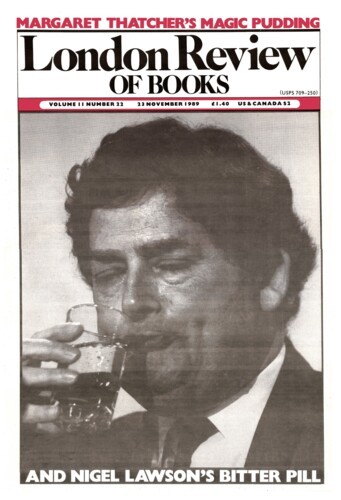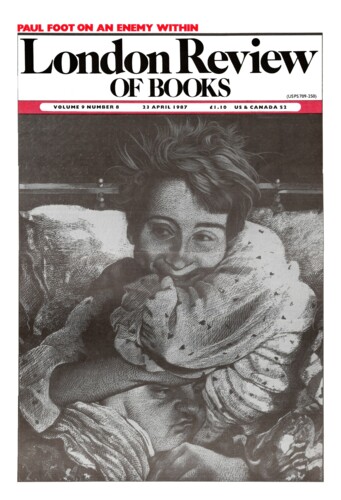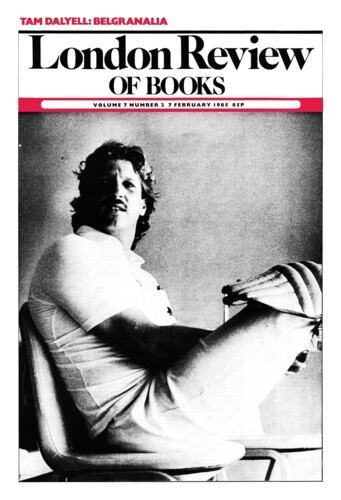Gillian Beer
Gillian Beer is a lecturer in English and a fellow of Girton College, Cambridge. A study of George Eliot in relation to Victorian feminist writing is due out later this year.
What about the aeroplanes?
23 April 1987
What about the aeroplanes?
Gillian Beer, 23 April 1987
‘If one spirit animates the whole, what about the aeroplanes?’ queries a character in Virginia Woolf’s last novel, Between the Acts. Both Alex Zwerdling in Virginia Woolf and the Real World and Lucio Ruotolo in The Interrupted Moment engage with the implications of this question – though neither has much to say about aeroplanes. Zwerdling concentrates on Woolf’s ‘intense interest in the life of society and its effect on the individual’; Ruotolo emphasises ‘the rhythm of broken sequence’. Zwerdling and Ruotolo recognise the urgency with which Woolf responds to the current moment in her final work. Ruotolo discovers a hoped-for continuity: what is interrupted is resumed, though changed in form by interruption. Zwerdling emphasises the diaspora of the self and of English society that is chillingly written into the book’s gossip: ‘Negation regularly has the last word.’ Ruotolo, in his book’s only surprising move, proceeds from his analysis of Between the Acts to claim Woolf for anarchism, though the anarchism for which he claims her proves to be generalised (‘All great art is anarchy’ – Gertrude Stein) and muted, a matter of ‘the liberating space of unguarded moments’.’
Clarkey
7 February 1985
A Stick on Fire
Gillian Beer, 7 February 1985
In her first public writing after her elopement with George Henry Lewes in 1854, George Eliot compared the position of women in England and in France: ‘in France alone the mind of woman has passed like an electric current through the language, making crisp and definite what is elsewhere heavy and blurred.’ And, writing under cover of anonymity for the Westminster Review, she declared that one reason for the achievement of women in France is ‘laxity of opinion and practice with regard to the marriage-tie … Gallantry and intrigue are sorry enough things in themselves, but they certainly serve better to arouse the dormant faculties of women than embroidery and domestic drudgery.’ She was then reviewing Victor Cousin’s Madame de Sablé, and Cousin had been briefly the lover of a woman whom Marian Evans (or George Eliot) already knew, and was to know better: Mary Clarke Mohl, whose style of writing and life might epitomise Marian Evans’s trenchant early views of women’s powers. Mary writes in her journal in 1826, when she was turning back from Cousin to her lover, Fauriel:
Pieces about Gillian Beer in the LRB
Englamouring the humdrum
Rosemary Ashton, 23 November 1989
Gillian Beer’s Arguing with the past, a collection of essays published in recent years (with one, on Richardson and Milton, dating from as long ago as 1968), is richly written, contains...
Homage to Mrs Brater
Rosemary Ashton, 7 August 1986
Was it sisterly or unsisterly of George Eliot to celebrate in Middlemarch Dorothea’s contribution to human progress by means of ‘unhistoric acts’ carried out under limiting...
Taking Darwin in
Michael Mason, 16 February 1984
This is at once an impressive, even thrilling book, and quite a bad one. Its virtues and vices are connected. The author has a precisely-grounded exhilaration about The Origin of Species; perhaps...
Read anywhere with the London Review of Books app, available now from the App Store for Apple devices, Google Play for Android devices and Amazon for your Kindle Fire.
Sign up to our newsletter
For highlights from the latest issue, our archive and the blog, as well as news, events and exclusive promotions.



